人教课标版高中英语必修五 Unit1 Using language 精品教案-新版
高中英语Unit 5 Using Language教案 新课标 人教版 必修1
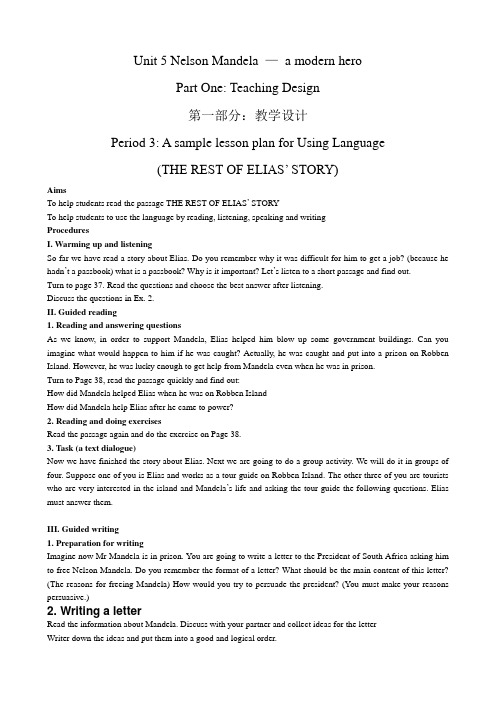
Unit 5 Nelson Mandela —a modern heroPart One: Teaching Design第一部分:教学设计Period 3: A sample lesson plan for Using Language(T HE REST OF ELIAS’ STORY)AimsTo help students read the passage THE REST OF ELIAS’ STORYTo help students to use the language by reading, listening, speaking and writingProceduresI. Warming up and listeningSo far we have read a story about Elias. Do you remember why it was difficult for him to get a job? (because he hadn’t a passbook) what is a passbook? Why is it important? Let’s listen to a short passage and find out.Turn to page 37. Read the questions and choose the best answer after listening.Discuss the questions in Ex. 2.II. Guided reading1. Reading and answering questionsAs we know, in order to support Mandela, Elias helped him blow up some government buildings. Can you imagine what would happen to him if he was caught? Actually, he was caught and put into a prison on Robben Island. However, he was lucky enough to get help from Mandela even when he was in prison.Turn to Page 38, read the passage quickly and find out:How did Mandela helped Elias when he was on Robben IslandHow did Mandela help Elias after he came to power?2. Reading and doing exercisesRead the passage again and do the exercise on Page 38.3. Task (a text dialogue)Now we have finished the story about Elias. Next we are going to do a group activity. We will do it in groups of four. Suppose one of you is Elias and works as a tour guide on Robben Island. The other three of you are tourists who are very interested in the island and Mandela’s life and asking the tour guide the following questions. Elias must answer them.III. Guided writing1. Preparation for writingImagine now Mr Mandela is in prison. You are going to write a letter to the President of South Africa asking him to free Nelson Mandela. Do you remember the format of a letter? What should be the main content of this letter? (The reasons for freeing Mandela) How would you try to persuade the president? (You must make your reasons persuasive.)2. Writing a letterRead the information about Mandela. Discuss with your partner and collect ideas for the letterWriter down the ideas and put them into a good and logical order.Write the letter.IV. Further applying1. Finding informationGo to the library to read or get online to search for more information on Nelson Mandela. Take notes of your finding and do an oral presentation next period.2. Writing a descriptionWrite a description of Nelson Mandela using the information you have found.V. Closing down by sharingShare your letter with your partners and make necessary changes.Share your letter with the class by reading it aloud.。
最新人教版高二英语必修五Unit1 Using language教学教材

[记一记]
only if (只有, 只要) 引导条件状语 从句, 置于句首时句子要部分倒装;
if only (但愿, 要是……就好了)其 后面的主句常用虚拟语气
[练一练] 用if only或only if填空。 ⑴ O__n_ly__i_f_ you eat the correct foods will you be able to keep fit and stay healthy. ⑵ _I_f_o_n_l_y we had arrived in time this morning, we would not have missed the train.
1. Why could he not tell about his theory? (Para 1)
Because the powerful Christian Church would have punished him for even suggesting such an idea. 2. What was his theory about? (Para 1)
Do you know what is the center of the solar system?
Can you name the eight planets in the solar system?
Saturn
Jupiter Neptune
Venus Earth
Mercury
Mars
Uranus
planets in the sky make sense.
1. Only if you put the sun there did the
movements of the other planets in the
Unit1UsingLanguage教学设计(一)高中英语人教版选择性
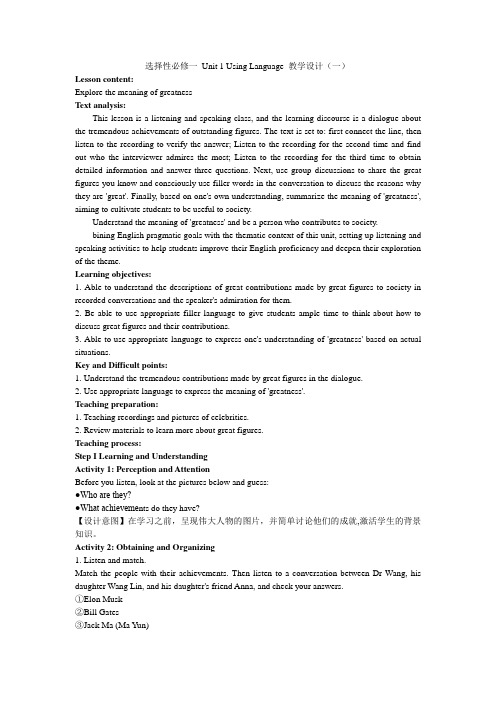
选择性必修一Unit 1 Using Language 教学设计(一)Lesson content:Explore the meaning of greatnessText analysis:This lesson is a listening and speaking class, and the learning discourse is a dialogue about the tremendous achievements of outstanding figures. The text is set to: first connect the line, then listen to the recording to verify the answer; Listen to the recording for the second time and find out who the interviewer admires the most; Listen to the recording for the third time to obtain detailed information and answer three questions. Next, use group discussions to share the great figures you know and consciously use filler words in the conversation to discuss the reasons why they are 'great'. Finally, based on one's own understanding, summarize the meaning of 'greatness', aiming to cultivate students to be useful to society.Understand the meaning of 'greatness' and be a person who contributes to society.bining English pragmatic goals with the thematic context of this unit, setting up listening and speaking activities to help students improve their English proficiency and deepen their exploration of the theme.Learning objectives:1. Able to understand the descriptions of great contributions made by great figures to society in recorded conversations and the speaker's admiration for them.2. Be able to use appropriate filler language to give students ample time to think about how to discuss great figures and their contributions.3. Able to use appropriate language to express one's understanding of 'greatness' based on actual situations.Key and Difficult points:1. Understand the tremendous contributions made by great figures in the dialogue.2. Use appropriate language to express the meaning of 'greatness'.Teaching preparation:1. Teaching recordings and pictures of celebrities.2. Review materials to learn more about great figures.Teaching process:Step I Learning and UnderstandingActivity 1: Perception and AttentionBefore you listen, look at the pictures below and guess:●Who are they?●What achieveme nts do they have?【设计意图】在学习之前,呈现伟大人物的图片,并简单讨论他们的成就,激活学生的背景知识。
人教版英语必修五 Unit 1 教案
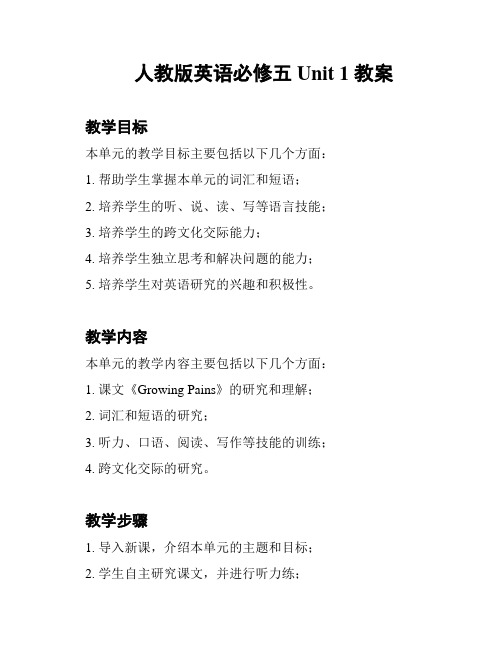
人教版英语必修五 Unit 1 教案教学目标本单元的教学目标主要包括以下几个方面:1. 帮助学生掌握本单元的词汇和短语;2. 培养学生的听、说、读、写等语言技能;3. 培养学生的跨文化交际能力;4. 培养学生独立思考和解决问题的能力;5. 培养学生对英语研究的兴趣和积极性。
教学内容本单元的教学内容主要包括以下几个方面:1. 课文《Growing Pains》的研究和理解;2. 词汇和短语的研究;3. 听力、口语、阅读、写作等技能的训练;4. 跨文化交际的研究。
教学步骤1. 导入新课,介绍本单元的主题和目标;2. 学生自主研究课文,并进行听力练;3. 进行课文的理解和讨论,引导学生思考和表达观点;4. 研究和掌握本单元的词汇和短语;5. 进行听说训练,提高学生的口语表达能力;6. 进行阅读和写作训练,培养学生的阅读理解和写作技能;7. 进行跨文化交际的研究,增进学生对英语和其他文化的认识。
教学评价本单元的教学评价主要以以下方式进行:1. 各种形式的课堂练和作业,检测学生对知识的掌握程度;2. 口语和写作表现的评价,评估学生语言运用的能力;3. 学生参与课堂讨论和发言的情况,评估学生的思维能力和表达能力。
教学资源本单元的教学资源包括以下几个方面:1. 课本《人教版英语必修五》;2. 音频材料;3. 多媒体设备;4. 教学课件和作业练册。
以上为《人教版英语必修五 Unit 1 教案》的简要内容,旨在帮助教师设计和安排本单元的教学活动。
具体的教学步骤和细节应根据实际情况进行调整和完善。
英语必修5人教版新课标Unit1第3课时教案.docx

英语必修5人教版新课标Unit 1第3课时教案Period 3 Listening and speaking (Using Language) Teaching Goals: 1. To use the Ianguage points and grammar of this unit.2.To develop SsTistening and speaking abilities.Teaching Procedures:Step L Leading-inPurpose: To activate Ss and arouse them to talk about scientific subjects.Show the pictures about the scientists and ask Ss whether they know them・ And make sure they know some famous scientists in China.Step 2. Warming UpPurpose: To lead Ss to the topic of this unit.1.Group workThe above pictures are all Chinese famous scientists・ Let Ss talk about the stories of them・ And they can also talk about other scientists in China. Get some Ss to present their stories to the rest of class. 2.ConclusionAll of them have made con tributi ons to the developme nt of Chin ese scie nee and tech no logy ・ But do you know who the father of the Chinese space program is? (Qian Xuesen)Step 3・ Pre-listeningPurpose: To help Ss learn about the context of the Listening part.1.Pair workAsk Ss to discuss the pictures with their partners.2.DiscussionDiscuss the following three questions and present your opinions to your classmates.(1)How can you describe the space?(2)If we human beings go into the space, what are needed?(3)Suppose you are an astronaut, what kind of qualities are necessary?Step 4. While-listeningPurpose: 1. To get the main information in the Listening part・2.To develop SsTistening ability.3.To learn something from Qian Xuesen.1.Listen to the dialogue, focusing on the subjects mentioned in the passage・2.Listen to the tape and answer the questions.Ql. What did Qian Xuesen study first?Q2. What experienee did he get in America that was very useful for China?Q3. What was Qian XueserVs achievement when he returned to China from America?Suggested answers:Al. Qian Xuesen first studied to be an engineer.A2・ In America he began to work on space rockets so that he was able to develop a space programme when he came back to China.A3. When Qian Xuesen returned to China he set up a Space Institute to begin training people in how to design and build rockets.3.Listen to the tape again and make sure the answers are right.Step 5. SpeakingPurpose: 1. To develop Ss z speaking ability.2. To learn about the words for character description.1.Pre-speakingPurpose: To arouse Ss〃interest and get them to focus on the topic of the Speaking part.Show the pictures again.Pair workLet Ss discuss in pairs and present how they achieved their success in their future scientific job・ What kind of words can be used?For your reference:tale nt, in tellige nee, hard work, persiste nee, con fide nee, curiosity, en thusiasm, luck•••2.While-speakingPurpose: To get Ss to talk about their favorite scientific jobs・(1) Work in groups of four and discuss what scientific job each of Ss would like to choose in the future・The following questions and expressions can be helpful.Questions:What job do you want to do?What personality will be needed?What education will you need?What personality will be needed?How lone will the training take?What work experienee would be useful?How will you prepare for this career?Expressions:(2) Act out the dialogue and show to the class.When describe someone〃s character; the following words can be used・patie nt, creative, hard-working, co-operative, con fide nt, brave, positive, pleasa nt, polite, determined, energetic, strict with •••Sample dialogue:A: What do you want to do when you grow up?B: I want to build robots. I will have to do a physics and mathematics degree in china. After that I hope to go abroad to Reading University in England where you can study all about robots. There is a special cybernetics department there.A: Why personality will be needed for that job?B: They have a lot of uses: for example, in making cars on a popular line or doing other repetitive jobs.A: What personality will be needed for that job?B: I think I need to be patient for my ideas will take a long time to develop. I also need to be creative eno ugh to have good ideas.A: What experienee will be most useful to you?B: I think tech no logy and engin eeri ng projects. I hope to work in a factory in my holidays.A: What kind of pers on makes a good inven tor?B: I think some one who is happy to persevere at somethi ng and learns from his mistakes.A: Thank you. I think designing robots sounds fun.3.Post-speakingAsk some Ss to give a speech to their classmates about their scientific jobs in the futureStep 6. ExtensionPurpose: To make a conclusion from the Speaking part.Discuss the questions below with your partners.We know that a scientific job is challenging and difficult, but there are still many persons doing very well at their positions. What can you learn from them?Share your views with your classmates・Step 7. Homework:L Write a short composition to introduce Qian Xuesen・2. Get on the line and find out more scientists and their stories.。
新课标人教版高中英语必修五 UNIT 1教案 已修改

Unit 1 Great scientistsLearning aims1.To help students learn to describe people。
2. Enable the Ss to familiar with some famous scientists and their contributions.3.To help students learn to read a narration about John Snow4.To help students learn to use some important words and expressionsImportant pointsTo help students better understand “Great scientists”To help students identify examples of “The Past Participle (1) as the Predicative & the attribute”7. Let the Ss learn the reading skill of getting the main idea of each para./ part & each passage .Difficult points1. Enable the Ss to learn how to organize a scientific research.2. Let the Ss learn the reading skill of getting the main idea of each para./ part & each passage .Teaching methods1. Skimming & scanning methods to make the Ss get a good understanding of the text.2.Discussion methods to make the Ss understand what they’ve learned in class.3.Pair work of group to get every student to take part in the teaching-and-learning activities.petition and role-play method to arouse the Ss’ interestTeaching Period: seven periodsPeriod 1 Warming up and pre-readingLearning aims1.To help students learn to describe people2.To help students learn to read a narration about John Snow3. Enable the Ss to familiar with some famous scientists and their contributions.Teaching ProceduresI. Warming upStep I Lead inTalk about scientist.T: Hi, morning, class. Nice to see you on this special day, the day when you become a senior two grader. I am happy to be with you helping you with your English. Today we are to read about a certain scientist. But first let’s define the word “scientist”. What is a scientist?A scientist is a person who works in science, trying to understand how the universe or other things work.Scientists can work in different areas of science. Here are some examples: Those that study physics are physicists. Those that study chemistry are chemists. Those that study biology are biologists.Step II Ask the students to try the quiz and find out who knows the most.T: There are some great scientific achievements that have changed the world. Can you name some of them? What kind of role do they play in the field of science? Do these achievements have anything in common? Match the inventions with their inventors below before you answer all these questions.1. Archimedes, Ancient Greek (287-212 BC), a mathematician.2. Charles Darwin, Britain (1808-1882). The name of the book is Origin of Species.3. Thomas Newcomen, British (1663-1729), an inventor of steam engine.4. Gregor Mendel, Czech, a botanist and geneticist.5. Marie Curie, Polish and French, a chemist and physicist.6. Thomas Edison, American, an inventor.7. Leonardo da Vinci, Italian, an artist.8. Sir Humphry Davy, British, an inventor and chemist.9. Zhang Heng, ancient China, an inventor.10. Stepper Hawking, British, a physicist.II. Pre-readingStep IGet the students to discuss the questions on page 1 with their partners. Then ask the students to report their work. Encourage the students to express their different opinions.1.What do you know about infectious diseases?Infectious diseases can be spread to other people. They have an unknown cause and need public health care to solve them. People may be exposed to infectious disease, so may animals, such as bird flu,AIDS, SARS are infectious diseases. Infectious diseases are difficult to cure.2.What do you know about cholera?Cholera is the illness caused by a bacterium called Vibrio cholerae. It infects people’s intestines(肠), causing diarrhea and leg cramps (抽筋).The most common cause of cholera is by someone eating food or drinking water that has been contaminated(污染) with the bacteria. Cholera can be mild(不严重的) or even without immediate symptoms(症状), but a severe case can lead to death without immediately treatment.3. Do you know how to prove a new idea in scientific research?Anybody might come out with a new idea. But how do we prove it in scientific research? There are seven stages in examining a new idea in scientific research. And they can be put in the following order. What order would you put the seven in? Just guess.Find a problem→ Make up a question→ Think of a method→ Collect results→Analyse the results→ Draw a conclusion→ Repeat if necessaryIII. Homework1.Finish the EX1,2and 3on Page 3.2.Read the article on Page 2 loudly.IV.Teaching reflectionPeriod 2 ReadingLearning aims1.To help students learn to read a narration about John Snow2.To help students better understand “Great scientists”Teaching ProceduresStep I Pre-reading1.Do you know John Snow?John Snow is a well-known doctor in the 19th century in London and he defeated “King Cholera”.2.Do you know what kind of disease is cholera?It is a kind of terrible disease caused by drinking dirty water and it caused a lot of deaths in the old times and it was very difficult to defeat.Let’s get to know how Dr. John Snow defeated “King Cholera” in 1854 in London in this reading passage:Step II SkimmingRead the passage and answer the questions.1.Who defeats “King Cholera“? (John Snow)2.What happened in 1854? (Cholera outbreak hit London.)3.How many people died in 10 days? (500)4.Why is there no death at No. 20 and 21 Broad Street as well as at No. 8 and 9Cambridge Street?(These families had not drunk the water from the Broad Street pump.)(Optional)Skim the passage and find the information to complete the form below.Step III ScanningRead the passage and number these events in the order that they happened.2 John Snow began to test two theories.1 An outbreak of cholera hit London in 1854.4 John Snow marked the deaths on a map.7 He announced that the water carried the disease.3 John Snow investigated two streets where the outbreak was very severe.8 King Cholera was defeated.5 He found that most of the deaths were near a water pump.6 He had the handle removed from the water pump.Step IV Main idea and correct stageRead the passage and put the correct stages into the reading about research into a disease.Step V Group discussionAnswer the questions (Finish exercise 2 on Page 3)1. John Snow believed Idea 2 was right. How did he finally prove it?(John Snow finally proved his idea because he found an outbreak that was clearly related to cholera, collected information and was able to tie cases outside the area to the polluted water.)2. Do you think John Snow would have solved this problem without the map?(No. The map helped John Snow organize his ideas. He was able to identify those households that had had many deaths and check their water-drinking habits. He identified those houses that had had no deaths and surveyed their drinking habits. The evidence clearly pointed to the polluted water being the cause.)3. Cholera is a 19th century disease. What disease do you think is similar to cholera today?(Two diseases, which are similar today, are SARS and AIDS because they are both serious, have an unknown cause and need public health care to solve them.)Step VI Homework1.Remmber the words and expressions of the article.ing the stages for scientific research and write a summary.3.Finish P4, Ex 1,2(on SB) Ex3 make sentences on exercisebook (make one’s way to, make up one’s mind, make sure, make room for)4.Find out the phrases according to the Chinese (part 1 on the paper for language points)5.Retell the story John Snow Defeats “King Cholera” by following the 7 steps on p16. Read notes to Unit 1, p78-79, find out some difficult points while reading the textIV.Teaching reflectionPeriod 3 Language focusLearning aims1.To help students better understand “Great scientists”2.To help students learn to use some important words and expressionsTeaching ProceduresStep I Homework checking.Step II. Expressions & phrases1.know about… 了解……的情况2.lift up 举起;抬起;提升3.steam engine 蒸汽机4.physical characteristic 人体的特征5.put forward a theory about black holes提出一个有关黑洞的理论6. infectious disease 传染性的疾病7. in scientific research 在科学研究上8. examine a new scientific idea验证一个新的科学思想9. draw a conclusion 得出结论10. analyze the results 分析结果11. a well-known doctor 一个著名的医生12. ordinary people 百姓;普通人13. expose (…)to sth. 暴露(…..)在……中14. the most deadly disease 最致命的疾病15. terrified people 被吓坏的人们16. get interested in sth./doing sth.对…产生兴趣17. absorb sth. into… 把….吸收入….18. gather the information 收集信息19. determine to do sth. 决心干某事20. a valuable clue 一条珍贵的线索21. the water pump 水泵22. in addition (to…) 除..…之外还有…23. link … to … 将…和…联系起来(be linked to…)24. have it delivered (have sth. done) 叫某人送东西25. die of… 死于…26. announce with certainty 肯定地宣布27. polluted water 被污染的水28. prevent sb. from doing sth.阻止某人干某事29. deal with… 处理……30. solve the problem 解决难题Expressions & Phrases (2)e to an end 到了尽头2.find the cause of this illness 找出疾病的起因3.look into… 调查……4.apart from…除…之外;此外(=except for…)5.prepare for… 预备好….6.be strict with sb. 对某人严格要求7.a revolutionary theory 一个革命性的理论8.lead to… 通向…. ;导致… (注意:to为介词)9.make sense 有意义10. at times =sometimes 有时候11. contribute to sth. 有助于;促进12. encourage sb. to do sth. 鼓励某人做某事13. point of view 观点14. living conditions 居住条件15. break… in/into pieces 把…摔成碎块16. be devoted to sth./sb.专致于.; 关心;挚爱…17. devote one’s life to doing sth. 献身于…..18. curved line 曲线19. achieve great success 取得巨大的成功Step IV. Language Points1.discover & inventdiscover v. “ 发现”被探索或被揭示的事物早已客观存在着.Eg. 1)Columbus discovered America in 1492.哥伦布于1492年发现了美洲.2)Who discovered radium? 谁发现了镭?invent v. “发明”,指的是发明原先不存在的东西.Eg.Who invented the steam engine? 谁发明了蒸汽机?2.who invented the way of giving electricity to everybody in large cities?是谁发明了把电带给大城市中的每个人的办法?the way of doing sth.= the way to do sth … “做…..的方法”She showed us the way of cleaning it.= She showed us the way to clean it.她教给我们清洗它的办法.the way引导的定语从句的引导词有三种, 可以用that;可以用in which;还可以省略.Eg.I don’t like the way (that / in which) you speak to your father.我不喜欢你跟你父亲讲话的方式.与way相关的短语:by the way 顺便说by way of … 通过……的方法,经,由lose one’s way 迷路no way (俚语) 没门,别想feel one’s way 摸黑走,谨慎从事on one’s way to…在去…的路上in this way=by this means=with this method用这种方法3.Who put forward a theory about black holes?谁提出了黑洞的理论?put forward(1) to offer (an idea, suggestion etc.) for consideration 提出(建议等)(2)推荐某人或自己任职位;提名Eg.May I put your name forward as our monitor? 我能否提名你当我们的班长?put away 抛弃;舍弃put down 写下来;记入名单;put on 穿上;戴上;增加put off 耽误;延期put out 熄灭(灯);扑灭(火) put up 建立;建造put up with… 忍受…… •You can take anything from the shelf and read, but please ______ the books when you’ve finished with them.A. put onB. put downC. put backD. put off4.This was the most deadly disease of its day.die (v.) dead (adj.) death (n.) deadly (adj.)adj. (1).dangerous; likely to cause death 危险的;致命的 a deadly disease/weapon (2). highly effective against sth. or sb不强有力的;致命的 a deadly remark 击中要害的评论(3)aiming to kill or destroy意在杀死的;不共戴天的: a deadly enemy不共戴天的敌人adv. (1). Very极度;非常;十分: deadly serious 十分认真(2). like death 死一般地: deadly pale 死一般苍白5.But he became inspired when he thought about helping ordinary people exposed to cholera. expose在句中是过去分词作后置定语,表示被动.意为“患霍乱的”.如:The book written by Luxun is very popular.expose v.(1)to make visible 暴露“expose ….to….”eg.He exposes his skin to the sun. 他把皮肤暴露在阳光下.(2)t o reveal the guilt or wrong doing of …揭露;揭发eg.He exposed their plot.他揭穿了他们的阴谋.I threatened to expose him ( to the police).我威胁要(向警察)揭发他.expose to 使易受,使受expose a fraud 揭穿骗局expose sth. to the light of day 把某事暴露于光天化日之下6. So many thousands of terrified people died every time there was an outbreak.每次爆发霍乱时就有大批惊慌的老百姓病死.every time是连词,引导时间状语从句,意为“每次,每当”,如:Every time I meet him, I always think of the things happened between us.每次见到他,我就想起发生在我们之间的事情.immediately, the moment, directly, instantly 等都可以作连词,引导时间状语从句,意为“一……就……”,eg. 1)I will give the letter to him immediately I see him.我一见到他就把这封信给他.2)I came directly I got your letter.我一接到你的信就来了.7.The first suggested that cholera multiplied in the air without reason.第一种看法是霍乱病毒在空气中无缘无故地繁殖着.(Suggest 用法参考P43.4,并完成相关的练习)8.absorb v. 吸收(液体);承受;承担(费用等)Eg.1)Use the cloth to absorb the spilled ink. 吸干撒的墨水2)We will not absorb these charges.我们不能承担这些费用.absorb…in/by..吸引.注意eg.I was absorbed in a book and didn’t hear you call.专心看书absorb…into…吸收…eg.The big company has gradually absorbed these small companies into its own organization. 这家大公司逐渐将这些小的公司吞并了。
新课标人教版必修五Book5 Unit1 Using language
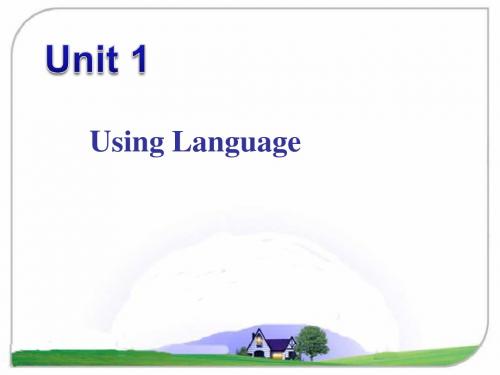
2) lead to 导致,通向 ①All roads lead to Rome. 条条大道通罗马
5. How did he explain changes in the movement of the planets and in the brightness of the stars? When did he publish his idea? (Para 4) He placed a fixed sun at the centre of the solar system with the planets going round it and only the moon still going round the earth. He also suggested that the earth was spinning as it went round it and this explain changes in the movement of the planets and in the brightness of the stars. He published his idea as he lay dying in 1543.
6. Why do people think that there is a direct link between his ideas and the work of Isaac Newton, Albert Einstein and Stephen Hawking?
人教版高中英语必修5 Unit1 Using language 精品教案
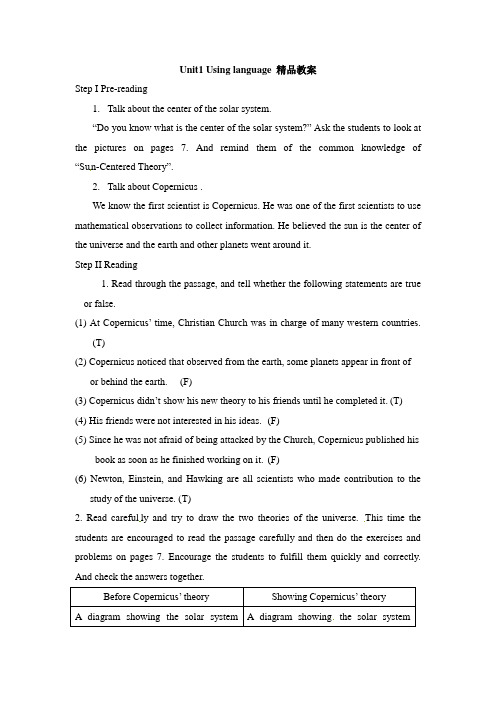
Unit1 Using language 精品教案Step I Pre-reading1.Talk about the center of the solar system.“Do you know what is the center of the solar system?” Ask the students to look at the pictures on pages 7. And remind them of the common knowledge of “Su n-Centered The ory”.2.Talk about Copernicus .We know the first scientist is Copernicus. He was one of the first scientists to use mathematical observations to collect information. He believed the sun is the center of the universe and the earth and other planets went around it.Step II Reading1. Read through the passage, and tell whether the following statements are true or false.(1) At Copernicus’ time, Christian Church was in charge of many western countries.(T)(2) Copernicus noticed that observed from the earth, some planets appear in front ofor behind the earth. (F)(3) Copernicus didn’t show his new theory to his friends until he completed it. (T)(4) His friends were not interested in his ideas. (F)(5) Since he was not afraid of being attacked by the Church, Copernicus published hisbook as soon as he finished working on it. (F)(6) Newton, Einstein, and Hawking are all scientists who made contribution to thestudy of the universe. (T)2. Read careful ly and try to draw the two theories of the universe. This time the students are encouraged to read the passage carefully and then do the exercises and problems on pages 7. Encourage the students to fulfill them quickly and correctly. And check the answers together.Step IV language pointsUsing language1. lead toSuch a mistake would perhaps lead to disaster.All roads lead to Rome.Too much work an d too little rest often lead to illness.His work leads to success in the end.2. Only放句首的倒装Only then did I realize that I was wrong.Only with hard work can you expect to get a pay riseOnly when the war was over was he able to get back to work.3. make sense讲得通,有意义; make sense of理解Does that seem to make sense?No matter how I tried to read it, the sentence does not make any sense to me.Tom, don’t listen to her. What she is saying doesn’t make sense.Does it make sense to let children play with the matches?Can you make sense of what I said / what the writer is saying?It would make sense to leave earl y.4. be enthusiastic for (about)…对…热心David is very enthusiastic about the plan.They are enthusiastic admirers of that movie star.My parents are enthusiastic skiers.滑雪迷Your father likes to play gold; he’s really enthusiastic about it.5. be cautious of / about 对…谨慎,慎重(带有提防、迟疑的心理)She is cautious of hurting his feelings.He was cautious about committing himself.The bank was very cautious about lending money.6. point of view观点、态度。
- 1、下载文档前请自行甄别文档内容的完整性,平台不提供额外的编辑、内容补充、找答案等附加服务。
- 2、"仅部分预览"的文档,不可在线预览部分如存在完整性等问题,可反馈申请退款(可完整预览的文档不适用该条件!)。
- 3、如文档侵犯您的权益,请联系客服反馈,我们会尽快为您处理(人工客服工作时间:9:00-18:30)。
Unit1 Using language 教案Step I Pre-reading1.Talk about the center of the solar system.“Do you know what is the center of the solar system?” Ask the students to look at the pictures on pages 7. And remind them of the common knowledge of “Su n-Centered Theo ry”.2.Talk about Copernicus .We know the first scientist is Copernicus. He was one of the first scientists to use mathematical observations to collect information. He believed the sun is the center of the universe and the earth and other planets went around it.Step II Reading1. Read through the passage, and tell whether the following statements are true or false.(1) At Copernicus’ time, Christian Church was in charge of many western countries.(T)(2) Copernicus noticed that observed from the earth, some planets appear in front ofor behind the earth. (F)(3) Copernicus didn’t show his new theory to his friends until he completed it. (T)(4) His friends were not interested in his ideas. (F)(5) Since he was not afraid of being attacked by the Church, Copernicus published hisbook as soon as he finished working on it. (F)(6) Newton, Einstein, and Hawking are all scientists who made contribution to thestudy of the universe. (T)2. Read careful ly and try to draw the two theories of the universe. This time the students are encouraged to read the passage carefully and then do the exercises and problems on pages 7. Encourage the students to fulfill them quickly and correctly. And check the answers together.Before Copernicus’ theory Showing Copernicus’ theoryA diagram showing the solar system A diagram showing the solar systemwith the Earth at its centre with the Sun at its centreStep IV language pointsUsing language1. lead toSuch a mistake would perhaps lead to disaster.All roads lead to Rome.Too much work an d too little rest often lead to illness.His work leads to success in the end.2. Only放句首的倒装Only then did I realize that I was wrong.Only with hard work can you expect to get a pay riseOnly when the war was over was he able to get back to work.3. make sense讲得通,有意义; make sense of理解Does that seem to make sense?No matter how I tried to read it, the sentence does not make any sense to me.Tom, don’t listen to her. What she is saying doesn’t make sense.Does it make sense to let children play with the matches?Can you make sense of what I said / what the writer is saying?It would make sense to leave earl y.4. be enthusiastic for (about)…对…热心David is very enthusiastic about the plan.They are enthusiastic admirers of that movie star.My parents are enthusiastic skiers.滑雪迷Your father likes to play gold; he’s really enthusiastic about it.5. be cautious of / about 对…谨慎,慎重(带有提防、迟疑的心理)She is cautious of hurting his feelings.He was cautious about committing himself.The bank was very cautious about lending money.6. point of view观点、态度If one has an open mind, it is easy to appreciate another’s point of view.From that point of view, the best choice is to support them.From my point of view, teachers are not well paid.7. 名词、副词当连词Every time I meet him, I always think of the things happened between us.I will give the letter to him immediately/the moment /directly/instantly I see him. 8.be to doYou are not to speak loudly in the office.The driver was to blame for the accident.9.have sth done结构中的宾补成分He had to have his car repaired, for it broke down this morning.Mark had his hair cut yesterday.10. debateWe had a debate yesterday. The lively debate really pumped us up.His heart was pumping fast.During the drought last year, the villagers had pumped the well dry, but got no more water.11. complete a. 彻底的,完整的,已完成的v.完成,使…完成I will complete this task soon.When will the work be complete?He is a complete scholar.When will the railway be completed?12. reject 拒绝,驳回,丢弃The supermarket rejected all spotted apples.He rejected their offer of a job.The child was rejected by its parents.13. in additionA number of people came to the zoo in addition to Peter and Paul.The teacher in addition to two students is at the meeting.In addition to giving a general introduction to computer, the course also providespractical experience.In addition to an album, I gave him a pen and a pencil.In addition to apples you asked for, I bought you some oranges.☆ apart fromWhat do you learn apart from English?Apart from being fun and good exercise, swimming is a very useful skill.☆ also;as well as;besides14. valueWhat is the value of this 18k white gold diamond necklace?-- It cost me $2,000 (=It was worth $2,000.), but I valued the necklace at $1,000.-- It was a valuable diamond necklace.☆ value n.: the amount of money that sth. is worthThe Longman Dictionary of Contemporary Engl ish is of great value to you.His research has been of no / little practical value.☆ value vt.: to decide that how much sth. is worthI value your friendship very highly.☆ valuable adj.: worth a lot of money。
